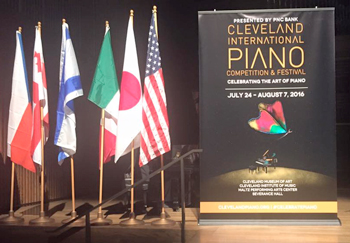by Neil McCalmont

Opening the day was Japan’s Yuta Yano, 24, who started with a delightfully bouncy reading of Scarlatti’s K. 62 sonata, followed by Toru Takemitsu’s Rain Tree Sketch II, which sounded like a mystical color palette. Yano’s pièce de résistance, Brahms’s Handel Variations, was full of depth — he captivatingly explored the contrasting character of each variation while still providing a coherent, large-scale interpretation of this thought-provoking work. The climax during the final variation was thrilling, and his fugue was equally as impressive.
Russia’s Ilya Kondratiev, 27, began with Chopin’s “Octaves” Étude, producing a fine finish after overcoming some wobbly tempos early on. His contemporary selection, Reflections on Love by Ella Milch-Sheriff, swerves through virtuosic emotional extremes, but they were no obstacle for the poetic and technical prowess of Kondratiev, who made a difficult and complex titan of a piece sound easy and fun. He ended with Schumann’s second sonata, which was full of passion and charm.
Ruoyu Huang of China, also 27, gave an overly expressive rendition of J.S. Bach’s Prelude and Fugue in d (WTC II), bringing out only the melody of the fugue rather than each of the lines. Following an appropriately jabbing second étude by Pascal Dusapin, his performance of the last twelve of Chopin’s 24 Preludes, Op. 28 was hit-or-miss. He seemed more focused on the moment-to-moment than on creating a larger arc across the twelve preludes.
Poland’s Łukasz Krupiński, 24, started with brilliantly clear playing of Haydn’s Sonata in A-flat, expressive but never indulgent. After a jazzy and fun C-Major Concert Étude by Nikolai Kapustin (which even made the serious-faced pianist smile!), he delivered two exquisite readings of Chopin pieces: an uplifting Grande Valse Brillante and a well-paced, dramatic fourth ballade. His flawless technique and the effortless flow he created in the music showed that he really “gets” Chopin (maybe there’s something in Poland’s drinking water).
27-year-old Yunqing Zhou (China) opened with two Scarlatti sonatas, K. 9 and 380, which were full of subtleties — it was amazing how much character he drew out of the music. His build-up in Liszt’s virtuosic arrangement of Wagner’s Liebestod was breathtaking, but the climax fell flat. He finished with a masterful interpretation of Schumann’s Symphonic Études, particular highlights of which included a rousing march in the fifth étude and his break-neck speed in the ninth, all while never missing a note.
Ending the first session was China’s Shen Lu, 30, who began with three performances of Scarlatti sonatas — K. 213, 480, and 209 — all articulated with crystalline clarity. His final choice, Brahms’s Paganini Variations, displayed his mature sense of musicality: his no-nonsense approach to the piece was full of expression. It was as if he and Brahms were on the same wavelength.
Georgia’s Luka Okros, 25, began the evening session displaying a flawless technique and a warm, nostalgic sound in Schumann’s Kinderszenen. After a stunning performance of Chopin’s “Octaves” Étude (not a hair out of place), his rendition of Otar Taktakishvili’s Poem was magnificently chill-inducing. He finished with Liszt’s sixth Paganini étude, highlighting his virtuosic talents while weaving a narrative throughout the variations.
30-year-old Brazilian Ronaldo Rolim played only one piece: Schumann’s Davidsbündlertänze, which was all he needed. The excellent contrast and variety he captured from section to section was surpassed only by his dramatically precise transition from the ethereal ending of the ninth to the vociferous tenth, bringing you to the edge of your seat. As Schumann’s music can often edge on the cryptic, Rolim’s ability to capture the spirit of each section was impressive.
USA’s Alexei Tartakovsky, 27, opened Haydn’s C-Major sonata with brilliantly rolled chords. His phrasing was lovely but his articulation a bit too brittle. He peaked during the dark, dream-like playing of Chopin’s Polonaise-fantasie, showing off his technical abilities with colorful runs. He ended by beautifully capturing the spirit of two Rachmaninoff preludes — in B-flat and G.
Russia’s Georgy Tchaidze, 28, gave a masterful performance of Beethoven’s 31st sonata in A-flat. His first movement flowed seamlessly from the pensive to the jubilant. The more heavily paced second movement struck with Olympic force, and the finale sounded as though he had a direct line to Beethoven, especially during the fugal moments. Afterward he delighted in four of Rachmaninoff’s Études-tableaux, displaying stunningly virtuosic technique.
Closing the evening session was Russia’s Nikita Mndoyants, 27, who began with an elegant reading of Schumann’s Davidsbündlertänze. His healthy pacing was matched by detailed and delicate articulation, which made his Romantic-sounding climaxes stand out. He finished with an epic reading of Chopin’s “Octaves” Étude, with a middle section that brought to mind childhood innocence.
After so many jaw-dropping performances, you can only imagine what the upcoming semi-finals will sound like!
Published on ClevelandClassical.com July 29, 2016.
Click here for a printable copy of this article


